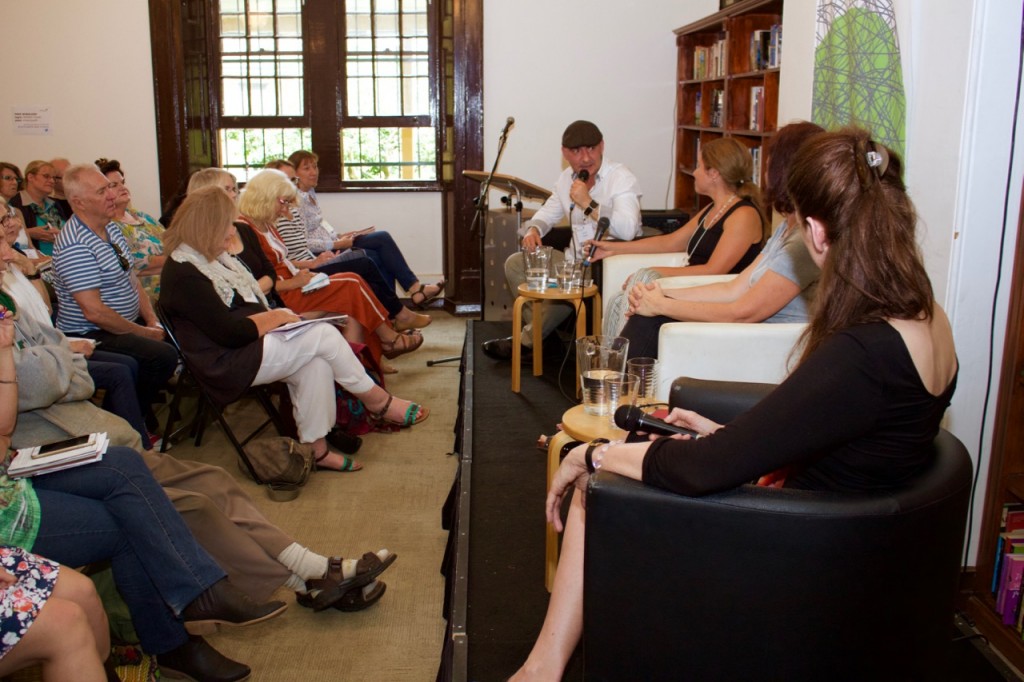A highlight of the Creative Non-Fiction Festival was a panel on research, featuring a number of award-winning authors, journalists, and historians. The panellists spoke to Mark Dapin, author and columnist for the Good Weekend, about the pitfalls to avoid, the fickleness of interview subjects, and the thrill of unexpected discoveries.
On the role of research in one’s writing:
‘Research is behind absolutely everything I do,’ says Helen O’Neill, an internationally published author and journalist. Helen has written five non-fiction books, and the concepts for all of them were sparked by research. According to Helen, research is demanding, but it’s also the backbone of her work. ‘It takes forever. It’s incredibly frustrating. And without it, I’d be lost.’
For Jane Gleeson-White, a book begins with an idea, rather than with research. When reflecting on the origins of her book, Double Entry, which explores the roots of modern accounting in 13th century Venice, Jane says she began with ‘the idea of a connection.’ The research followed, and Jane moved abroad to Venice in order to continue her project. If your research requires you to live in the most beautiful city in the world, Jane says with a smile, she very much recommends it.
But this can’t always be the case. As Clare Wright, Stella award-winning writer and historian, points out, it’s important to weigh up the possible ‘research gains’ against the other demands of your life. While living near Ballarat, Clare began her research into the Eureka Stockade, eventually producing The Forgotten Rebels of Eureka in 2014. But she had to balance the demands of raising a young family at the same time, so it would have been difficult had her research taken her anywhere far from home.
On the joys and difficulties of oral research:
Helen says that there are clear pitfalls to interviewing participants for information; if the researcher hasn’t been careful, she might unwittingly quote opinions as facts. Thorough supplementary research is crucial. And of course there’s a knack to getting what you want out of a subject. ‘Interviewing is a skill in itself,’ Helen says.
In terms of techniques, Mark Dapin suggests building rapport with a subject by asking them about where they grew up and where their parents are from. Getting an understanding about someone’s personal history is a good way to begin a connection. For Jane, sometimes the best interviews can come out of stumbling onto the right source at the right time. One interview subject was able to give Jane a wealth of information all in one sitting; all she had to do was sit down and listen.
All the same, there can be surprising risk in interviewing some subjects, especially those who insist on having their stories and histories told in a particular way, as Clare Wright discovered when researching the Eureka Stockade. ‘There are Eurekaphiles and Eurekaphobes,’ Clare says. ‘And they’re both barking mad.’ At one point, an interview subject became so persistent that she had to take out a restraining order against him. The life of a writer-researcher isn’t always as quiet at it seems!
On the exhilarating moments of discovery:
Research can often feel like thankless drudgery, but very occasionally, after many painstaking hours and a little luck, a researcher may uncover something new and wonderful. While writing his most recent book, Mark Dapin wanted to pin down the flights of soldiers travelling back home from the Vietnam War, but the records had all been lost. Eventually, he came across the corporate insurance records of the flight stewards, which detailed their movements, and this solved his problem for him in an unexpected way. Mark put the question to his co-panellists: What was your greatest archival research moment?
Jane Gleeson-White: In 2008, Jane was researching Luca Pacioli, the father of modern accounting and Leonardo Da Vinci’s maths teacher. Pacioli had made the strange assertion that he’d played a part in developing the rules of chess, a claim most modern scholars found laughable. Then a new piece of evidence emerged: a book by Pacioli, outlining developments that would lead to modern chess, and illustrations of the chess pieces in Da Vinci’s own hand. The discovery wasn’t Jane’s, but it was marvellously exciting to watch.
Helen O’Neill: While researching renowned Australian architect Harry Seidler, Helen realised that though Seidler had written and thought extensively about shape, patterns, light, and many other things in his artistic approach, he had barely ever mentioned colour. While swimming at the beach one morning, the thought struck Helen suddenly: ‘I wonder if he was colourblind?’ A conversation with Seidler’s widow confirmed the theory, and shed new light on his life’s work.
Clare Wright: ‘When I started out, academics said, “What could you possibly say about Eureka that no one’s ever said?” I said, “I’m going to go back to the same archives and ask questions no one’s asked before.”’ It worked. By re-examining the Lazarus Diary, a well-known piece of archival evidence detailing the lead-up to and the events of the Eureka Stockade, Clare found reference to a woman who was a victim of the massacre. The diary, as it turned out, contained proof that women had been more active in the movement than previously documented. This research led Clare to another intriguing discovery: the writer of the Lazarus Diary was not Samuel Lazarus but instead a man named Charles Evans. This discovery unearthed further evidence: the twin diary of Charles’ brother, George. By following a hunch, Clare found herself expanding the field of Eureka scholarship.
Recap by NSW Writers’ Centre intern Ren Arcamone.

